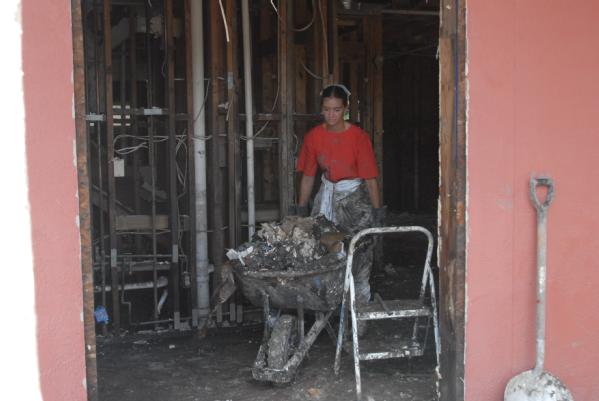Roland Phillips, a leader of the French and Indian community called Grand Bayou in Plaquemines Parish, LA, had ridden out five hurricanes, including Katrina. So he decided to stay put for Hurricane Isaac, which hit land on Aug. 29, 2012. “I’ll never stay through a storm again,” Phillips told me. “It was the worst I ever experienced. It stayed on top of us for two days and two nights; it just ate us up.”

CAPTION: LaPlace, La., Sep. 13, 2012 -- Volunteers from Samaritan’s Purse International Relief install blue tarp to keep rain from a home damaged by Hurricane Isaac.
Hurricane Isaac may not have had the most powerful winds the Gulf Coast has ever known, but it moved so slowly through such a wide swath of communities over many states, including the northeast, that its force, for some, was more frightening than Hurricane Katrina.
No matter: faith-based and other voluntary groups responded during the storm and will be there for months, and perhaps years helping survivors recover. Volunteers staffed emergency shelters, served thousands of meals, delivered fresh water, chain-sawed fallen trees, “mudded out” homes and church sanctuaries, installed blue plastic tarps on torn roofs, fielded phone calls and provided emotional and spiritual care. In the future, they will rebuild homes and houses of worship and provide case management services that connect survivors to government and other benefits.

CAPTION: Plaquemines Parish, La., Sep. 13, 2012 -- Volunteers from the Mennonite Disaster Service survey the work in progress at a home damaged by Hurricane Isaac.
The Rev. Michael Giles, pastor of Bethlehem Missionary Baptist Church in Braithwaite, LA, knows about hurricanes. As president of Christian Ministers Missionary Baptist Association, he has been active in rebuilding homes destroyed by Katrina. With Hurricane Isaac, Rev. Giles moved from being a volunteer to being a survivor. His home and church were flooded by the storm. When I asked him about the faith-based volunteers he was working alongside to mud out his church, he said, “I’ve got one word to describe them: awesome.” He continued: “They never stop working. They work hard. They never complain.”
Eight-foot Water Line
Steven Bledsoe is the chair of the Committee for Plaquemines Rebuilding. This long-term recovery group started soon after Katrina. Like Rev. Giles, Bledsoe is not only a leader of volunteer and community groups helping the area recover from Katrina; he too is a survivor of Hurricane Isaac. “I had two feet of water in my home with Katrina. That’s why I got involved in long-term recovery.” He then showed me the eight-foot water line inside his home’s first floor left by flood waters from Hurricane Isaac. Faith-based volunteers from another group worked around us as we stood where his living room had been. They were tearing down molding sheetrock and shoveling muddy debris into wheelbarrows. “The volunteers?” he said. “I can’t say enough about them. They don’t say a lot about it, but I know their faith encourages them to volunteer.”

CAPTION: Plaquemines Parish, La., Sep. 12, 2012 -- A volunteer from the Mennonite Disaster Service hauls debris from a home damaged by Hurricane Isaac.
A gas station and convenience store located on the east bank of Plaquemines Parish near the Belle Chase Ferry landing had become a gathering place for survivors and volunteers. Yet a third faith-based group had set up a mobile feeding station in the store’s parking lot, as the store was closed due to flooding. It was lunch time and people were lined up for meals to be served. Survivors I met included Braithwaite fire chief Urban Treuil (who also owned the gas station and store) and Gregory Meyer, an ice-truck delivery man. Both men and their families had long months of recovery ahead of them. Meyer’s home, which was raised on stilts to prevent its flooding, had been built in 1721. Six generations of his family had lived there. Now it was drying out from 10 feet of floodwaters. I asked him what he was going to do. “I’m coming home, man. My family and I are going to come home. But we’re feeling alone. Don’t forget us.”
I promised him that we wouldn’t, that his story would be told. And I am confident, with the amazing commitment of thousands of volunteers yet to come to the area, he and the other survivors of Hurricane Isaac throughout Louisiana, Mississippi, numerous other states, will see another and better day.


Add new comment